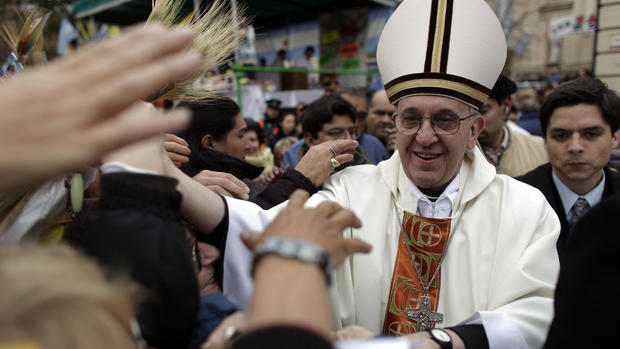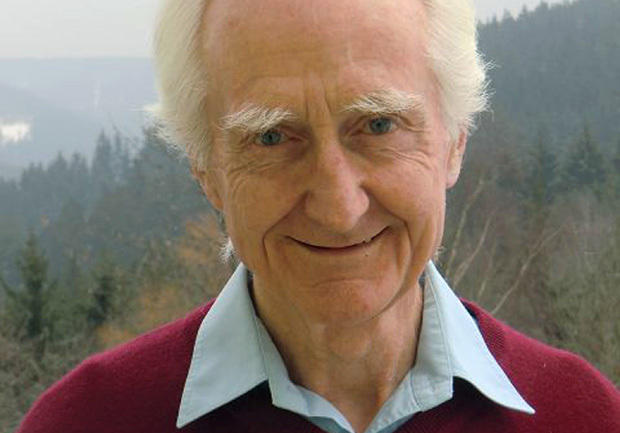Was new pope complicit in Argentina's "dirty war?"
Almost as soon as Cardinal Jorge Mario Bergoglio was chosen as Pope Francis, charges surfaced that he was to some degree involved in the so-called "dirty war" during the years when Argentina was ruled by a military dictatorship (1976-1983) - a period when the future pope was the head of the Jesuit order in the country.
The dictatorship was notorious for human rights violations. At least 30,000 people were killed by the military, some tossed out of airplanes into the ocean after being tortured. Thousands more were simply tortured as the dictatorship chased "subversives," real and imagined, and moved to stifle any dissent whatsoever.
Aftershocks are still being felt today as the military stole the infant children of kidnapped women who gave birth in captivity and then gave custody of those children to military families after killing the birth mother. Some of those children, now grown, are trying to find out who their real parents were and what happened to them; others prefer not to know.
That brings us to the most serious charge against the new pope - that he was somehow involved in the military's kidnapping of two Jesuit priests who had been organizing the poor. The priests were held for months at a well known torture center inside a Navy School known by its Spanish initials as ESMA.
- A pope of firsts: Jesuit, Latin American and Francis
- Jorge Mario Bergoglio: Who is new pope?
- Complete coverage: Change at the Vatican
What is without doubt is that then Father Bergoglio, who at the time headed up the Jesuits in Argentina, lifted church protection from the two a week before their kidnapping because he felt their radical views and activities were no longer in line with Jesuit teaching. It is still not clear if his actions played any role in the priests' kidnapping. Charges that go beyond this and say Bergoglio was actively involved in their kidnapping are simply not backed up by any facts.
Shortly before the 2005 conclave (in which Bergoglio reportedly came in second to Cardinal Joseph Ratzinger in the voting to succeed John Paul II), he was sued by an Argentine lawyer and charged with being in part to blame for the kidnapping. He refused to comment on the charges, which a spokesman labeled "slander," and the suit was eventually dismissed. Some saw the accusations as politically motivated in an attempt to keep him from being chosen as pope at the time.
Bergoglio has since been more outspoken. In his authorized 2010 biography "El Jesuita," he denies any role in the kidnapping and in fact says he interceded to help free the two kidnapped Jesuits as well as helping other victims of the dictatorship. But that's where the case gets murky. Father Orlando Yorio, one of the priests (who died in 2000), is quoted by Argentine journalist Horacio Verbitsky as saying he had "no reason to think he did something for our freedom but rather the opposite."
Monica Mignone, a woman who worked with the two kidnapped priests, was also kidnapped and never seen again. Verbitsky spoke with her mother who he quotes as saying, "the priests were freed by the efforts of (noted human rights lawyer and father of the victim) Emilio Mignone and the intercession of the Vatican, not by the actions of Bergoglio, who betrayed them." Unfortunately there are no documents to provide conclusive proof one way or the other.
On Friday the Reverend Francisco Jalics, one of the two kidnapped priests who is now at a seminary in Germany, put out a statement saying that years after the incident, he had met Bergoglio and the two had "discussed the events."
"Following that, we celebrated Mass publicly together and hugged solemnly. I am reconciled to the events and consider the matter to be closed," he said. Father Yorio, the other kidnapped priest, was critical of Bergoglio, who he felt endangered the two by criticizing their work.
Adolfo Perez Esquivel, the Argentine who won the Nobel Peace Prize for his human rights advocacy in 1980 (while the military was still in power), said on his website that Bergoglio did not work with the dictatorship, but had also not spoken out strongly against it.
"I do not consider that Jorge Bergoglio was complicit in the dictatorship, but I believe he lacked the courage to join our struggle for human rights in the most difficult moments," he wrote after voicing his hope that the new pope "has the courage to defend the rights of the people in the face of the powerful without repeating the serious errors and even sins that the church committed."
Vatican Spokesman Father Federico Lombardi said Friday that the accusations were false and "reveal anti-clerical left-wing elements that are used to attack the Church."
"There has never been a concrete or credible accusation," against the new pope, Lombardi added.
A human rights worker in Argentina who has followed the case closely says that it is important to keep in mind the role that the Argentine church played during the dictatorship. Unlike its counterparts in some other Latin American countries (such as Chile, El Salvador and to a lesser extent, Nicaragua), the church in Argentina was not an outspoken opponent of the dictatorship. Some members of the church actively and publicly collaborated with the military; most were simply passive and did little one way or another.
In the end, we will probably never be able to say for sure exactly what Bergoglio's role was. He was certainly not among the most public defenders of the dictatorship but there's no real way of telling how strongly he resisted. It's a matter of either taking him, or his accusers, at their word. We may not have enough facts to draw conclusions about the new pope's past actions but that situation will change. Now that he holds one of the most public jobs in the world, we will certainly know far more about his future actions.
Editor's Note: This article was updated with a new comment from Adolfo Perez Esquivel March 16, 2013.

